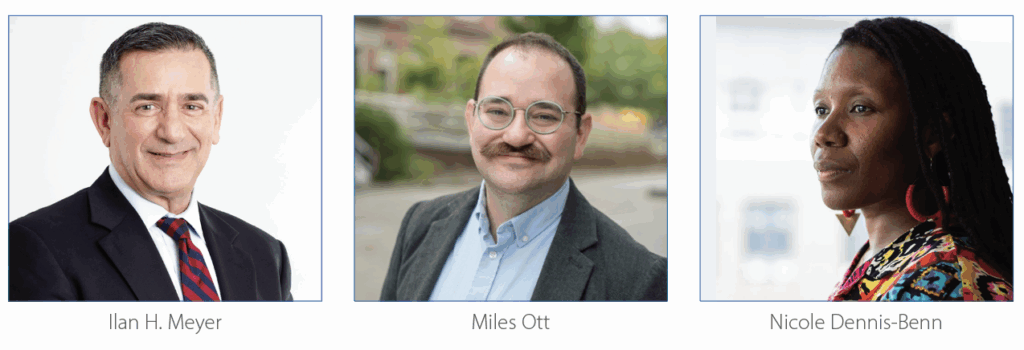Beyond the Myth of ‘Hard to Reach’: Considerations for Engaging LGBTQIA+ Communities
Yates Coley
The Justice, Equity, Diversity, and Inclusion (JEDI) Outreach Group Corner is a regular component of Amstat News in which statisticians write about and educate our community about JEDI-related matters. If you have an idea or article for the column, email the JEDI Corner manager.
It is commonly believed that lesbian, gay, bisexual, transgender, queer, intersex, and asexual populations are “hard to reach” for research participation. Not so, say the three expert presenters for the ASA LGBTQ+ Advocacy Committee’s inaugural webinar, “Sociocultural and Analytical Considerations for Engaging LGBTQIA+ Communities.”
The cross-disciplinary panel included epidemiologist Ilan H. Meyer, statistician Miles Ott, and writer Nicole Dennis-Benn, who agree research with LGBTQIA+ populations is no more challenging than any other target population. Yet, the myth of being hard to reach persists, discouraging emerging researchers from pursuing work in this area and excusing poor-quality research. Each speaker presented approaches for improving the quality, relevance, and impact of research with LGBTQIA+ populations.
Meyer, distinguished senior scholar for public policy at the UCLA School of Law Williams Institute, described survey designs to advance research with LGBTQIA+ populations. Population-level surveys (e.g., the US Centers for Disease Control and Preventions’ Behavioral Risk Factor Surveillance System and the Census Bureau’s Pulse studies) are valuable for estimating marginal rates of particular characteristics and identities. Several federal studies now include questions about sexual orientation and gender identity. But even larger population-level surveys rarely have large enough sample sizes to include sufficient LGBTQIA+ people.
Alternatively, investigator-initiated studies such as Meyer’s Generations and TransPop studies extend probability sampling approaches. Researchers for these first used a brief screen to identify LGBTQ+ respondents in the general population and then invited eligible individuals to participate in a comprehensive survey.
Other investigator-initiated studies using nonprobability sampling methods, such as the 2015 US Transgender Survey, have provided data about the LGBTQIA+ community for decades and been a powerful source of information about the experience of LGBTQIA+ people. Such studies may not have a well-defined sampling frame. (There are opportunities for statisticians to contribute to methods development in the design and analysis of these less traditional study designs.) Meyer emphasized there are no bad samples, but sampling approaches should be designed to meet study aims.
Ott, senior data scientist at Tubi, discussed the importance of having LGBTQIA+ research leaders and partners driving evidence creation and policy development. To build toward that goal, Ott’s presentation focused on how we can encourage LGBTQIA+ potential statisticians. As an educator, he has incorporated several practices into his teaching to create a supportive environment and demonstrate the meaningful impact students can have as statisticians. His course materials highlight the contributions of statisticians with identities that have been historically under-recognized in statistics curricula, including LGBTQIA+ statisticians. Ott also avoids “othering” and “minoritizing” examples (such as assuming gender is binary) and is intentional about including examples of queer and trans joy, rather than only including negative portrayals of LGBTQIA+ experiences.
Ott and co-authors Alicia Johnson and Mine Dogucu also follow these principles in their textbook, Bayes Rules!. Throughout the book, they were thoughtful to cite and highlight the diverse statisticians who contribute to the development and practice of statistics, even encouraging readers to picture themselves as the next generation of Bayesian statisticians. When publishing their book, they also prioritized accessibility—Bayes Rules! is available at no cost and is screen-reader compatible.
Dennis-Benn, award-winning author of Patsy and Here Comes the Sun, closed the webinar with a discussion about the powerful role storytelling can play in the practice and study of public health. Her most recent novel, Patsy, tells the story of the title character, who emigrated from Brooklyn to Jamaica to escape a motherhood she did not choose and reunite with her childhood girlfriend. It’s also a coming-of-age story for her gender nonconforming child, Tru.
Patsy and Tru’s journeys bring to life the intersecting dynamics influencing health and health care among LGBTQIA+ folks—Patsy is not only a lesbian but also a Black woman and undocumented immigrant. Each intersecting identity affects her health and well-being. Patsy’s story also illustrates the all-too-common challenge of accessing necessary care. In Jamaica, where abortion is illegal, Patsy is forced to give birth against her wishes. As an undocumented immigrant in New York, Patsy struggles to access care for depression in the face of insurance barriers and medical racism.
One notable aspect of the LGBTQIA+ experience highlighted in Patsy is that Patsy doesn’t use the labels “lesbian” or “queer” for herself. Similarly, Tru doesn’t self-identify as “trans” or “gender nonconforming.” Research that relies on these terms may fail to recruit a sample that reflects the diversity of the LGBTQIA+ community. This exemplifies the importance of including a diverse group of LGBTQIA+ community members (including researchers) when planning and conducting a study in this population.
A recording of this and other webinars is available on the JEDI outreach group website.



















Leave your response!